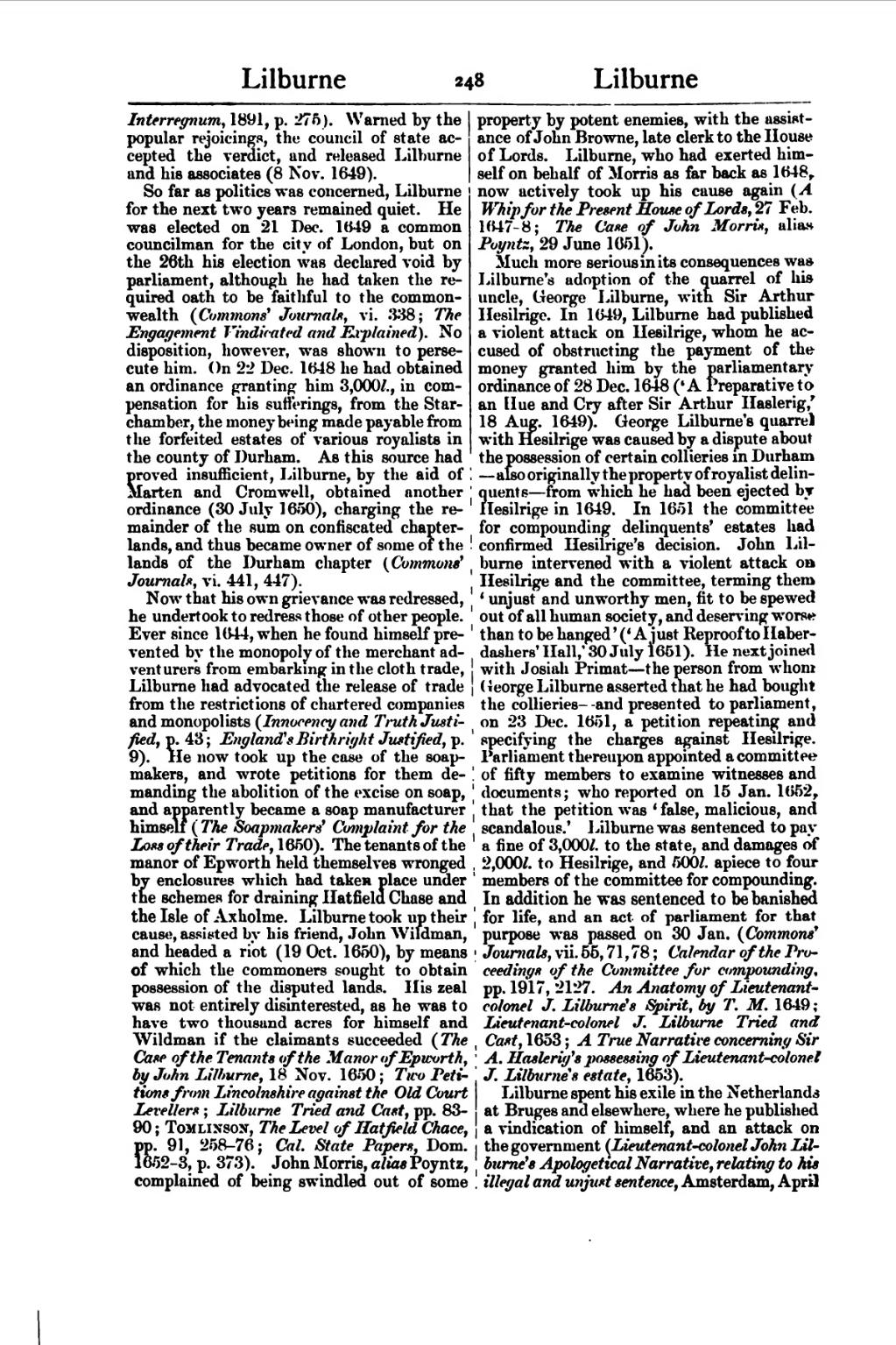Interregnum, 1891, p. 275). Warned by the popular rejoicings, the council of state accepted the verdict, and released Lilburne and his associates (8 Nov. 1649).
So far as politics was concerned, Lilburne for the next two years remained quiet. He was elected on 21 Dec. 1649 a common councilman for the city of London, but on the 26th his election was declared void by parliament, although he had taken the required oath to be faithful to the commonwealth (Commons' Journal, vi. 338; The Engagement Vindicated and Explained). No disposition, however, was shown to persecute him. On 22 Dec. 1648 he had obtained an ordinance granting him 3,000l., in compensation for his sufferings, from the Star-chamber, the money being made payable from the forfeited estates of various royalists in the county of Durham. As this source had proved insufficient, Lilburne, by the aid of Marten and Cromwell, obtained another ordinance (30 July 1650), charging the remainder of the sum on confiscated chapter-lands, and thus became owner of some of the lands of the Durham chapter (Commons' Journals, vi. 441, 447).
Now that his own grievance was redressed, he undertook to redress those of other people. Ever since 1644, when he found himself prevented by the monopoly of the merchant adventurers from embarking in the cloth trade, Lilburne had advocated the release of trade from the restrictions of chartered companies and monopolists (Innocency and Truth Justified, p. 43; England's Birthright Justified, p. 9). He now took up the case of the soap-makers, and wrote petitions for them demanding the abolition of the excise on soap, and apparently became a soap manufacturer himself (The Soapmakers' Complaint for the Loss of their Trade, 1650). The tenants of the manor of Epworth hold themselves wronged by enclosures which had taken place under the schemes for draining Hatfield Chase and the Isle of Axholme. Lilburne took up their cause, assisted by his friend, John Wildman, and headed a riot (19 Oct. 1650), by means of which the commoners sought to obtain possession of the disputed lands. His zeal was not entirely disinterested, as he was to have two thousand acres for himself and Wildman if the claimants succeeded (The Case of the Tenants of the Manor of Epworth, by John Lilburne, 18 Nov. 1650; Two Petitions from Lincolnshire against the Old Court Levellers; Lilburne Tried and Cast, pp. 83–90; Tomlinson, The Level of Hatfield Chace, pp. 91, 258–76; Cal. State Papers, Dom. 1652–3, p. 373). John Morris, alias Poyntz, complained of being swindled out of some property by potent enemies, with the assistance of John Browne, late clerk to the House of Lords. Lilburne, who had exerted himself on behalf of Morris as far back as 1648, now actively took up his cause again (A Whip for the Present House of Lords, 27 Feb. 1647–8; The Case of John Morris, alias Poyntz, 29 June 1651).
Much more serious in its consequences was Lilburne's adoption of the quarrel of his uncle, George Lilburne, with Sir Arthur Hesilrige. In 1649, Lilburne had published a violent attack on Hesilrige, whom he accused of obstructing the payment of the money granted him by the parliamentary ordinance of 28 Dec. 1648 ('A Preparative to an Hue and Cry after Sir Arthur Haslerig,' 18 Aug. 1649). George Lilburne's quarrel with Hesilrige was caused by a dispute about the possession of certain collieries in Durham—also originally the property of royalist delinquents—from which he had been ejected by Hesilrige in 1649. In 1651 the committee for compounding delinquents' estates had confirmed Hesilrige's decision. John Lilburne intervened with a violent attack on Hesilrige and the committee, terming them 'unjust and unworthy men, fit to be spewed out of all human society, and deserving worse than to be hanged' ('A just Reproof to Haberdashers' Hall,' 30 July 1651). He next joined with Josiah Primat—the person from whom George Lilburne asserted that he had bought the collieries—and presented to parliament, on 23 Dec. 1651, a petition repeating and specifying the charges against Hesilrige. Parliament thereupon appointed a committee of fifty members to examine witnesses and documents; who reported on 16 Jan. 1653, that the petition was 'false, malicious, and scandalous.' Lilburne was sentenced to pay a fine of 3,000l. to the state, and damages of 2,000l. to Hesilrige, and 500l. apiece to four members of the committee for compounding. In addition he was sentenced to be banished for life, and an act of parliament for that purpose was passed on 30 Jan. (Commons' Journals, vii. 55, 71, 78; Calendar of the Proceedings of the Committee for compounding, pp. 1917, 2127. An Anatomy of Lieutenant-colonel J. Lilburne's Spirit, by T. M. 1649; Lieutenant-colonel J. Lilburne Tried and Cast, 1653; A True Narrative concerning Sir A. Haslerig's possessing of Lieutenant-colonel J. Lilburne's estate, 1653).
Lilburne spent his exile in the Netherlands at Bruges and elsewhere, where he published a vindication of himself, and an attack on the government (Lieutenant-colonel John Lilburne's Apologetical Narrative, relating to his illegal and unjust sentence, Amsterdam, April

